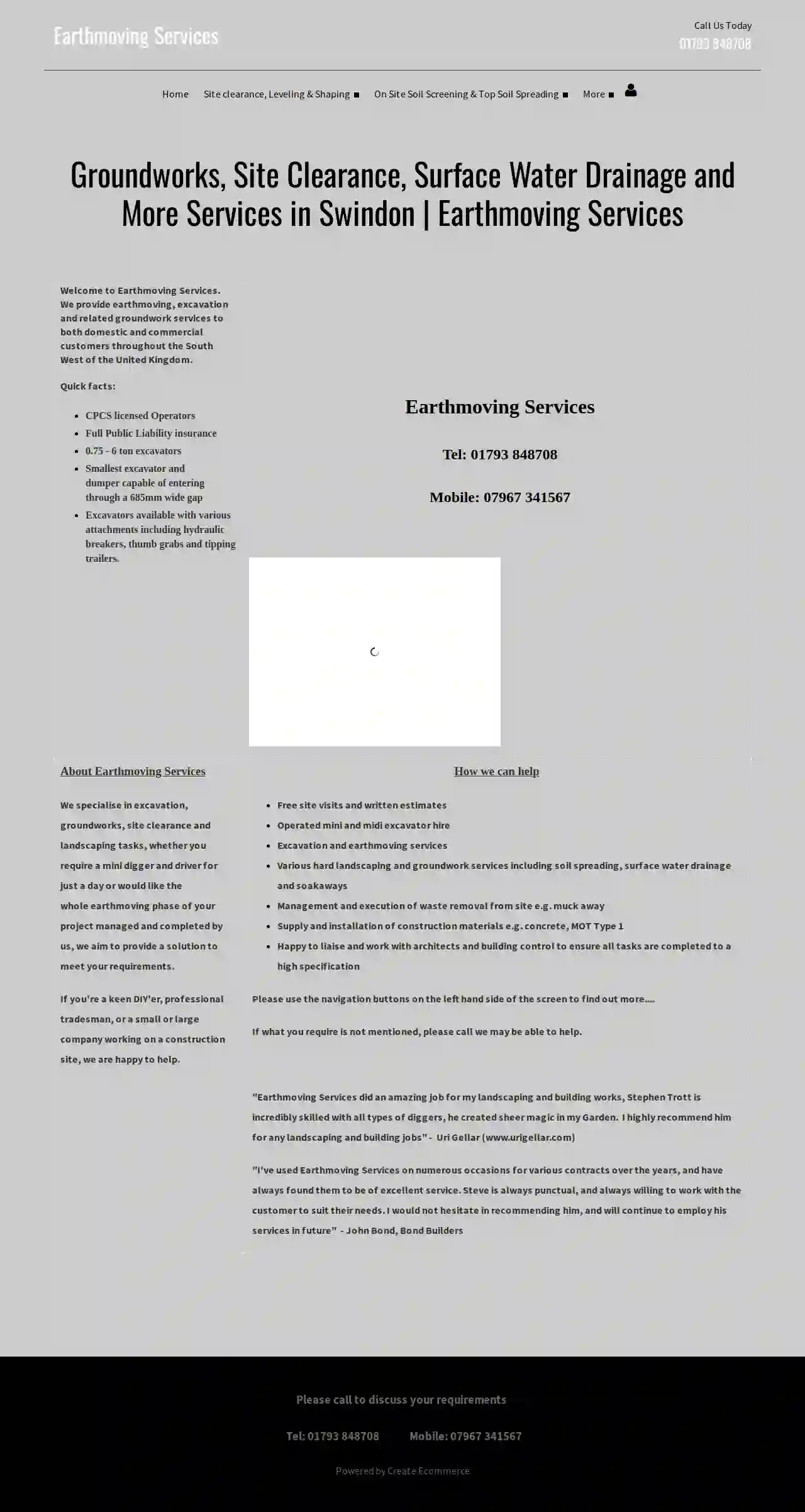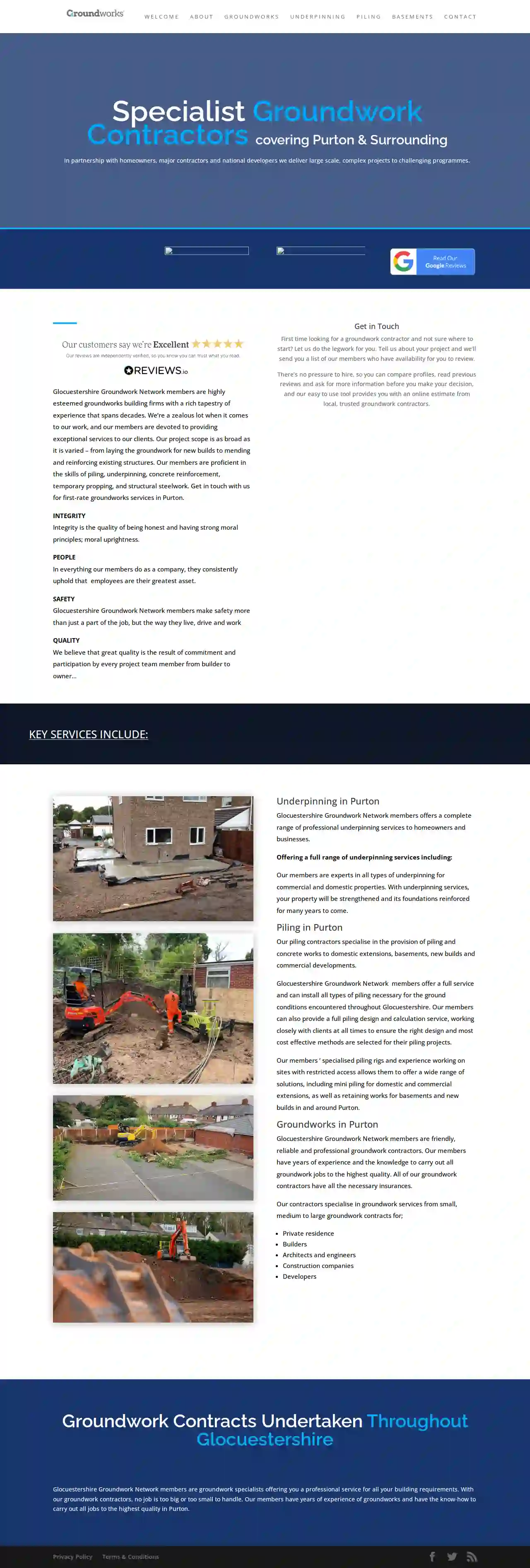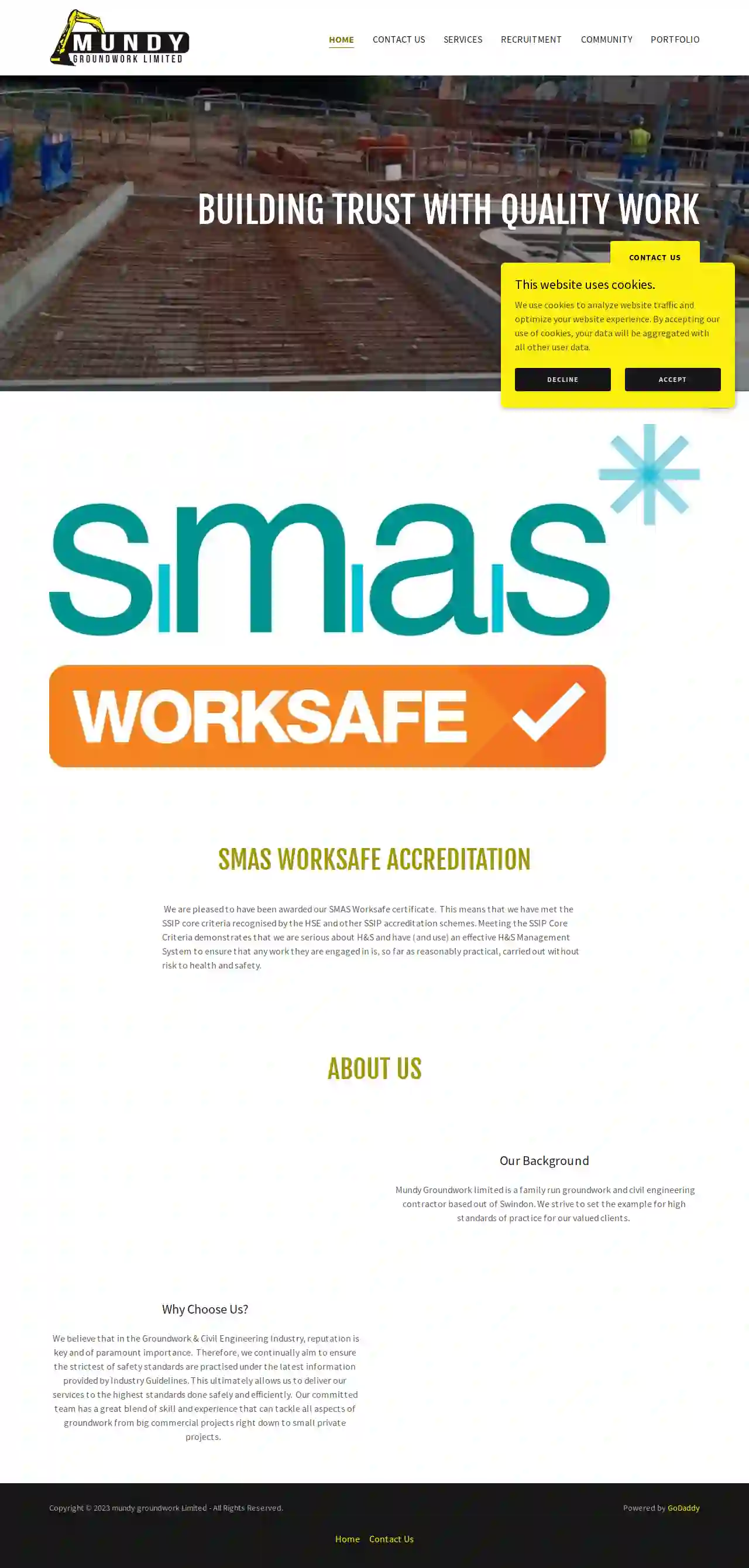Excavation Contractors Blunsdon Saint Andrew
Find the best Land Excavation in Blunsdon Saint Andrew
Receive up to 3 Excavating Contractors quotes for your project today! Compare profiles, reviews, accreditations, portfolio, etc... and choose the best service.

Earthmoving Services
53 reviewsSwindon, GBWelcome to Earthmoving Services. We provide earthmoving, excavation and related groundwork services to both domestic and commercial customers throughout the South West of the United Kingdom. Quick facts: CPCS licensed Operators Full Public Liability insurance 0.75 - 6 ton excavators Smallest excavator and dumper capable of entering through a 685mm wide gap Excavators available with various attachments including hydraulic breakers, thumb grabs and tipping trailers. About Earthmoving Services We specialise in excavation, groundworks, site clearance and landscaping tasks, whether you require a mini digger and driver for just a day or would like the whole earthmoving phase of your project managed and completed by us, we aim to provide a solution to meet your requirements. If you're a keen DIY'er, professional tradesman, or a small or large company working on a construction site, we are happy to help. How we can help Free site visits and written estimates Operated mini and midi excavator hire Excavation and earthmoving services Various hard landscaping and groundwork services including soil spreading, surface water drainage and soakaways Management and execution of waste removal from site e.g. muck away Supply and installation of construction materials e.g. concrete, MOT Type 1 Happy to liaise and work with architects and building control to ensure all tasks are completed to a high specification Please use the navigation buttons on the left hand side of the screen to find out more.... If what you require is not mentioned, please call we may be able to help. Testimonials "Earthmoving Services did an amazing job for my landscaping and building works, Stephen Trott is incredibly skilled with all types of diggers, he created sheer magic in my Garden. I highly recommend him for any landscaping and building jobs" - Uri Gellar (www.urigellar.com) "I've used Earthmoving Services on numerous occasions for various contracts over the years, and have always found them to be of excellent service. Steve is always punctual, and always willing to work with the customer to suit their needs. I would not hesitate in recommending him, and will continue to employ his services in future" - John Bond, Bond Builders
- Services
- Why Us?
- Testimonials
- Gallery
Get Quote
CG Utilities
17 reviewsKiln Lane, Swindon, SN2 2NP, GBLEADING UTILITY CONTRACTORS IN UK Tier 2 contractors in multi utility services, EVC, telecom and civils. From planning to management, from implementation to perfection. CG Utilities are a specialist contractor with our values and culture being shaped by our passion for technology and delivering for communities across the country. We are a team of knowledgeable, experienced operators and offer clients an unprecedented level of quality and expertise. We adopt a proactive approach and are experienced in working both as a principal contractor and as a subcontractor - with a range of clients across multiple sectors. CG works across a broad spectrum of industry sectors, offering a wide range of specialisms to deliver projects up and down the UK. ...more about us
- Services
- Why Us?
- Gallery
Get Quote
Combined construction
13 Isis Lake, South Cerney, Glos, GL7 5LT, GBCombined Construction Solutions Ltd We are a local building company based in Swindon Wiltshire, covering all aspects of general building. Our team of skilled tradesmen have experience in new builds, extensions, loft conversions, garage conversions, general building, renovations and general maintenance. We work with domestic clients and homeowners and are fully insured. We deliver to the highest standards by forming a close working relationship with our clients, ensuring complete satisfaction every time. Our attention to detail and passionate managerial approach ensures we complete on time with minimal disruption.
- Services
- Why Us?
- Gallery
Get Quote
Archaeological Management Services Ltd. t/a Foundations Archaeology
Shaftesbury Centre, Percy Street, Swindon, Wiltshire, SN2 2AZ, GBAbout Foundations Archaeology Since 1995, Foundations Archaeology has been providing high-quality and cost-effective Archaeology and Built Heritage solutions across the UK. Whatever the size of your project, from a single house extension to a large housing development, renewable energy project, pipeline or road scheme, Foundations Archaeology has the experience to assist you at every stage. Our wide range of services assist clients from the pre-planning advice stage through to discharge of planning conditions. Foundations Archaeology offers a comprehensive and professional nationwide service, providing commercially aware support where and when our clients need it. Our repeat business shows our dedication and commitment to our clients. Testimonials "I can confirm that I have instructed and worked with Foundations Archaeology on numerous developments both for Linden Homes and Persimmon Homes over the past decade. I have always found Foundations Archaeology to be economical, professional, responsive and eager to work with our site and design teams to undertake investigation works promptly and to assist us in discharging our Planning responsibilities with the minimum amount of disruption to the overall development programme. I would not hesitate in recommending Roy and his team to any developer or individual needing the services of a practical and professional Archaeological Consultant". Nick Ashfield Regional Technical Manager Linden Homes "Countryside Renewables would not hesitate to recommend Foundations for complex archaeological planning requirements and negotiations with demanding councils. We used Foundations for a large solar plus storage project in Wales. Their deep experience, commercial understanding and wide knowledge base ultimately resulted in a reasonable outcome acceptable to all parties. Foundations were extremely reliable - delivering high quality work on time. Foundations' combination of experience, reasonableness, high standards and ability to meet deadlines is a rare find in archaeology! " John Dunlop Founder Countryside Renewables
- Services
- Why Us?
- Accreditations
- Testimonials
- Gallery
Get Quote
Byrne & King Ltd
4.86 reviewsFolly Down Farm, Packhorse Lane, Purton, Nr. Swindon Wilsthire, Swindon, SN5 4HU, GBAbout Byrne & King Ltd Established in 1995, Byrne & King Ltd has been providing domestic and commercial customers across the Home Counties and the South of England with high quality construction and groundworks services for over 17 years. With over 50 years previous experience between them, Tony Byrne and Shaun King founded the company with the aim of providing a range of building, contracting and plant hire services that excel in quality and levels of customer service. Our Commitment to Excellence Over 17 years later, we are still providing customers with that same high level of service and the vast majority of our work is repeat business and word of mouth recommendations. As one of Wiltshire’s leading construction and groundworks specialists, we offer a wide range of services and are able to provide a full level of service, from tender to final completion of projects. We specialise in earthworks, drainage, ducting and services installation, reinforced concrete and external works like kerbing and paving. Our Team As we want to remain at the top of our industry, we only employ the very best. Therefore, you can be sure that any work carried out by Byrne & King is being completed is highly skilled, professional and vastly experienced builders. Our Services Although we primarily operate across the South of England, Midlands and Wales, we can complete projects further afield, depending on scope and contract size. In addition to quality and service, we also place great emphasis on safety; all our employees receive regular health and safety training. Works are carried out in accordance with project specific Method Statements and Risk Assessments. Since the beginning of 2008, we have a 100% compliant CSCS/CPCS qualified labour force. Our Location Based just outside Swindon, we provide our construction, building and contracting services to domestic and commercial customers across the Home Counties and the South of England, including Swindon, Bristol, Gloucester, Cambridge, London, Newhaven, Helston, Barnstaple, Portsmouth, Bognor Regis, Sussex and along the M4 Corridor. Contact Us Today So if you are looking for a company to carry out high quality construction or building work at your commercial or domestic property, look no further than the specialists at Byrne & King. Contact us today to discuss your requirements with one of our helpful and friendly team.
- Services
- Why Us?
- Accreditations
- Gallery
Get Quote
Donovan Construction
32 reviewsSuite 2A, Lucena House, Shaw Village Centre, Lucena House Shaw Village Centre Swindon, Swindon, SN5 5PY, GBDonovan Construction: Building Excellence in the South West Donovan Construction is a reputable building company based in the South West of England. We are dedicated to delivering high-quality construction projects, prioritizing reliability and effective cost management throughout the entire building process. Our team of experienced professionals is committed to exceeding client expectations, ensuring a smooth and successful project from start to finish. We specialize in a wide range of construction services, including: Renovation New Homes Restoration Specialist Works At Donovan Construction, we understand the importance of building strong relationships with our clients. We take pride in our open communication, transparency, and collaborative approach, ensuring that your vision is realized with meticulous attention to detail. Whether you are planning a renovation, a new home build, or a restoration project, Donovan Construction is your trusted partner for exceptional craftsmanship and reliable service.
- Services
- Why Us?
- Gallery
Get Quote
B L Baker Groundworks
Swindon, GBSpecialist Groundwork Contractors covering Purton & Surrounding In partnership with homeowners, major contractors and national developers we deliver large scale, complex projects to challenging programmes. Glocuestershire Groundwork Network members are highly esteemed groundworks building firms with a rich tapestry of experience that spans decades. We’re a zealous lot when it comes to our work, and our members are devoted to providing exceptional services to our clients. Our project scope is as broad as it is varied – from laying the groundwork for new builds to mending and reinforcing existing structures. Our members are proficient in the skills of piling, underpinning, concrete reinforcement, temporary propping, and structural steelwork. Get in touch with us for first-rate groundworks services in Purton. Our Values INTEGRITY Integrity is the quality of being honest and having strong moral principles; moral uprightness. PEOPLE In everything our members do as a company, they consistently uphold that employees are their greatest asset. SAFETY Glocuestershire Groundwork Network members make safety more than just a part of the job, but the way they live, drive and work QUALITY We believe that great quality is the result of commitment and participation by every project team member from builder to owner… Get in Touch First time looking for a groundwork contractor and not sure where to start? Let us do the legwork for you. Tell us about your project and we’ll send you a list of our members who have availability for you to review. There’s no pressure to hire, so you can compare profiles, read previous reviews and ask for more information before you make your decision, and our easy to use tool provides you with an online estimate from local, trusted groundwork contractors.
- Services
- Why Us?
- Gallery
Get Quote
DBX Construction Ltd
4.98 reviewsSwindon, GBBuilding confidence in the Construction Industry. DBX Construction & Plant Hire Swindon is more than just a construction company—we're your trusted ally in realizing your vision. With a decade of experience in Swindon, we've built a reputation for quality, professionalism, and innovation. From bespoke homes to commercial developments and Plant Hire, our commitment to quality and professionalism shines through every project. Our skilled team combines expertise with innovation to deliver lasting results. Whether it's a new venture or property enhancement, we're here to exceed your expectations. With transparent communication and competitive pricing, your satisfaction is our priority. Explore our portfolio and discover why DBX Construction is your ideal choice. Experience excellence with us.
- Services
- Why Us?
- Gallery
Get Quote
MD Groundworks
Swindon, GBAbout Us MD Groundworks has over 35 years experience within the Construction industry. A family owned business who specialise in groundworks for extensions and one off new builds. Providing a service in Swindon and the surrounding areas. We also do patios and driveways as well as drainage and fencing. We take the hassle out of the first stage of your project. We can give you the strong foundations you can build on.
- Services
- Why Us?
- Gallery
Get Quote
Mundy Groundwork Limited
Swindon, England, United Kingdom, GBBuilding Trust With Quality Work Mundy Groundwork limited is a family run groundwork and civil engineering contractor based out of Swindon. We strive to set the example for high standards of practice for our valued clients. We believe that in the Groundwork & Civil Engineering Industry, reputation is key and of paramount importance. Therefore, we continually aim to ensure the strictest of safety standards are practised under the latest information provided by Industry Guidelines. This ultimately allows us to deliver our services to the highest standards done safely and efficiently. Our committed team has a great blend of skill and experience that can tackle all aspects of groundwork from big commercial projects right down to small private projects.
- Services
- Why Us?
- Gallery
Get Quote
Over 13,059+ Excavation Contractors registered
Our excavation pros operate in Blunsdon Saint Andrew & beyond!
ExcavationHQ has curated and vetted Top Excavation Pros near Blunsdon Saint Andrew. Find a reliable contractor today.
Frequently Asked Questions About Excavation Contractors
- Determine the Area: Measure the length and width of the area you want to fill. Multiply them to get the area in square feet (or meters).
- Determine the Depth: Measure the difference between the existing grade and the desired grade (how much you need to raise the ground). This is the depth of fill required.
- Calculate Volume: Multiply the area (step 1) by the depth (step 2) to get the volume in cubic feet (or meters).
- Account for Compaction: Fill dirt compacts when it settles, so add 10% to 25% to the calculated volume to account for compaction. The exact percentage depends on the type of fill material.
- Topsoil Removal: Stripping the fertile topsoil layer from a site, often preserving it for landscaping.
- Trench Excavation: Digging long, narrow trenches for utilities (pipes, cables) or foundations.
- Basement Excavation: Removing earth to create a space for a basement beneath a structure.
- Pool Excavation: Digging a precise hole for installing a swimming pool.
- Roadway Excavation: Removing earth and preparing the ground for road construction.
- Demolition Excavation: Clearing debris and preparing the site after demolition.
- Channel Excavation: Creating channels for drainage or irrigation.
- Basement Size: The larger the basement, the more excavation is required, increasing the cost.
- Soil Type: Excavating rocky or dense clay soil is generally more expensive than loose soil.
- Accessibility: Difficult-to-access sites might require specialized equipment or more labor, driving up costs.
- Foundation Type: The chosen foundation type (full basement, crawl space, slab) affects excavation needs.
- Underpinning: If underpinning (strengthening existing foundations) is necessary, it significantly increases costs.
- Disposal Fees: Hauling excavated soil to disposal sites adds to the overall expense.
How do I calculate how much dirt I need for fill?
What are the different types of excavation?
What is the difference between topsoil and subsoil?
Topsoil: The uppermost layer, typically rich in organic matter, nutrients, and microorganisms. It's essential for plant growth and is often darker in color.
Subsoil: The layer beneath the topsoil, containing less organic matter and generally denser. It provides support for roots but is less fertile than topsoil.
During excavation, topsoil is often removed and preserved separately for later use in landscaping, while subsoil is typically used for backfilling or other less demanding applications.
How much does it cost to excavate a basement?
How do I calculate how much dirt I need for fill?
- Determine the Area: Measure the length and width of the area you want to fill. Multiply them to get the area in square feet (or meters).
- Determine the Depth: Measure the difference between the existing grade and the desired grade (how much you need to raise the ground). This is the depth of fill required.
- Calculate Volume: Multiply the area (step 1) by the depth (step 2) to get the volume in cubic feet (or meters).
- Account for Compaction: Fill dirt compacts when it settles, so add 10% to 25% to the calculated volume to account for compaction. The exact percentage depends on the type of fill material.
What are the different types of excavation?
- Topsoil Removal: Stripping the fertile topsoil layer from a site, often preserving it for landscaping.
- Trench Excavation: Digging long, narrow trenches for utilities (pipes, cables) or foundations.
- Basement Excavation: Removing earth to create a space for a basement beneath a structure.
- Pool Excavation: Digging a precise hole for installing a swimming pool.
- Roadway Excavation: Removing earth and preparing the ground for road construction.
- Demolition Excavation: Clearing debris and preparing the site after demolition.
- Channel Excavation: Creating channels for drainage or irrigation.
What is the difference between topsoil and subsoil?
Topsoil: The uppermost layer, typically rich in organic matter, nutrients, and microorganisms. It's essential for plant growth and is often darker in color.
Subsoil: The layer beneath the topsoil, containing less organic matter and generally denser. It provides support for roots but is less fertile than topsoil.
During excavation, topsoil is often removed and preserved separately for later use in landscaping, while subsoil is typically used for backfilling or other less demanding applications.
How much does it cost to excavate a basement?
- Basement Size: The larger the basement, the more excavation is required, increasing the cost.
- Soil Type: Excavating rocky or dense clay soil is generally more expensive than loose soil.
- Accessibility: Difficult-to-access sites might require specialized equipment or more labor, driving up costs.
- Foundation Type: The chosen foundation type (full basement, crawl space, slab) affects excavation needs.
- Underpinning: If underpinning (strengthening existing foundations) is necessary, it significantly increases costs.
- Disposal Fees: Hauling excavated soil to disposal sites adds to the overall expense.